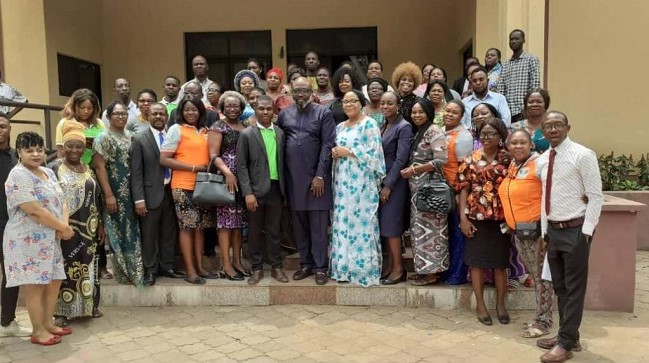It is no longer news that climate change represents one of the greatest challenges of our time. The phenomenon has a devastating effect on the environment, leading to loss of livelihood, lifestyle, biodiversity, property as well as human lives.

However, these impacts are felt more in vulnerable rural communities, with women, children and girls dominating the group. Women have to trek kilometres in search of food, water and fuel wood.
Therefore, women including young girls bear the additional risk posed by climate change on people, which includes the resulting disease burden.
Unfortunately, they seem to lack the knowledge and leadership capacity to cope and change the narrative. Experts have underlined the need for women to take up climate leadership and advocacy and at the community and national levels as well as.
A non-governmental organisation (NGO), the African Centre for Climate Action and Rural Development (ACCARD), took up the campaign at a recent daylong Capacity Building Workshop for Women in Climate Change Management and Community Development, with the theme “Women and True leadership” held on February 27, 2020, in Asaba, Delta State.
ACCARD held the event in collaboration with the World Bank Climate Investment Fund (CIF), African Development Bank (AfDB), Kelecha Akpe Foundation, Federal Ministry of Environment, Delta State Ministry of Environment, Centre for Environment and Sustainable Livelihood Project, Genetics Society of Nigeria (Edo/Delta) and the Delta State Government.
The workshop was designed to increase the capacity of women (including girls) to lead efforts and/or initiatives in environment and climate management.
Participants discussed the role of women in various spheres of climate change management, as well as adaptation and mitigation strategies.
Coordinator of ACCARD, Elohor Freeman Oluowo, reaffirmed the organisation’s commitment to building capacity of women, and creating opportunities for them.
He added that lack of transparency and poor government commitment have impeded the fight against climate change.
Commissioner for Environment, Delta State, Christain Onogba, governmenthas implemented a series of programmes to train and empower women to champion climate actions.
Represented by the Director of Climate Change in the ministry, he noted that the leadership role of women in any family brings peace and such qualities can be replicated in climate actions.
A guest speaker, Dr Omo-Irabor, a lecturer in the Department of Earth Science, Federal University of Petroleum Resources, in her presentation on “Adaptation Strategies to Climate Change Impact on Agriculture and Health”, gave a breakdown of how human activities impact the environment and stressed that the current warm temperature is an evidence of climate change.
She urged farmers to adopt climate smart agriculture by using climate resilient seedlings and mixed cropping. On strategies to reduce climate impact on human health, she suggested frequent visits to natures parks, avoid hotspot for Co2 emissions and regular medical checks.
Dr Kenneth Omokhafe, a Director in the Rubber Research Institute of Nigeria, said the impact of climate change has continued to reduce crop yields, altered biodiversity, as well as increased flooding and disease outbreaks.
He noted that nature-based solutions are one of the cost effective measures to climate change adaptation.
Mrs Vivian Briggs, a Deputy Director in the Department of Climate Change in the Delta State Ministry of Environment, lamented that women over the years have been marginalised by climate change governance.
She explained that government has put in place measures to mainstream gender into climate change policy, including solutions such as fuel wood management, planting of millennium seed for fuel wood, efficient cooking stove programme as well as in the integrated territorial agreement plan.
According to her, these initiatives have the potential to sustainably build women’s capacity and tackle climate change.
A gender expert from Zimbabwe, Mrs Gertrude Kenyangi, spoke on gender roles in climate leadership and community development in Africa. According to her, although women contribute largely to the leadership deficit by not supporting themselves, the current governance structure and societal perception of women especially in Africa is responsible for current gender imbalance in climate and environmental governance.
Therefore, she said, women must take leadership role in climate action by force because they have the power to lead and even do better in leadership roles.
She stressed the need for women to get adequate education, both formal and informal means, like the present workshop, to build their leadership capacity to be at the fore front of climate advocacy, particularly in mobilising women at the grassroots level.
Dora Nsuwa Cudjoe, an environmental specialist and Senior Operations Manager with World Bank / Climate Investment Fund (CIF) in Washington, in her presentation on “Women’s Role in Climate Funds Management, Investment and Opportunities”, urged participants to form community based organisations (CBOs) to come up with innovative solutions to combat climate change.
According to her, the World Bank is ready to finance CBOs with innovation to tackle climate change adaptation and mitigation.
She highlighted several World Bank Initiatives in mainstreaming gender into climate policy framework and how they have prioritised women’s voices in the energy and forestry sectors.
The event featured a break-out session where participants engaged in group discussions to synthesise the main messages from the workshop and recommended ways to support women’s inclusion in climate change management.
They recommended thus: more grassroot education and sensitisation on climate change; formation of community-based organisations and other climate-related women groups; that women should initiate climate smart projects and lead tree planting projects in their surroundings: take own basket to the market to reduce nylon or plastic use; government should mainstream gender into climate policy framework; kitchen waste conversion to manure for garden farm; inclusion of environmental education into primary and secondary education; and, help their husbands to design and build climate adaptive homes.
